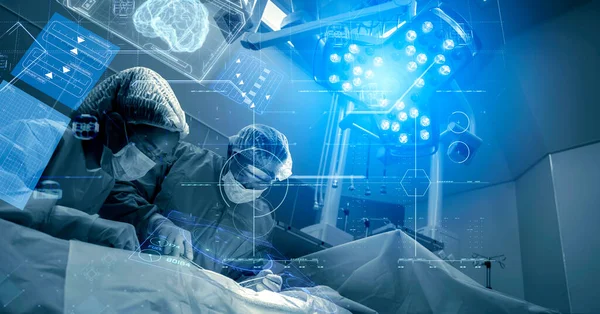Share this @internewscast.com
Understanding “Advantages and Disadvantages of Artificial Intelligence in Healthcare” In the realm of modern healthcare, the integration of Artificial Intelligence (AI) has ushered in a new era marked by innovation and efficiency. However, like any transformative technology, AI in healthcare is not without its intricacies. This article delves into the advantages and Disadvantages of Artificial Intelligence in Healthcare, shedding light on the multifaceted impact it has on the industry.

Advantages of Artificial Intelligence in Healthcare
1. Precision Medicine
Artificial Intelligence facilitates the tailoring of medical treatments to individual characteristics by analyzing vast datasets, including genetic information. This precision approach enhances diagnosis and treatment efficacy, paving the way for more personalized healthcare solutions.
2. Efficient Diagnosis
AI-powered diagnostic tools, such as machine learning algorithms, expedite the diagnostic process by swiftly analyzing medical images, pathology reports, and patient data. This expeditious approach can be critical in time-sensitive situations.
3. Predictive Analytics for Disease Prevention
By harnessing predictive analytics, AI aids in identifying potential health risks and predicting disease outbreaks. This proactive approach allows healthcare professionals to implement preventive measures, thereby reducing the burden on the healthcare system.
4. Enhanced Drug Discovery
The integration of AI accelerates drug discovery by analyzing vast datasets to identify potential drug candidates and predict their efficacy. This not only expedites the development process but also contributes to the creation of more targeted and effective pharmaceuticals.
5. Streamlined Administrative Tasks
Administrative burdens in healthcare are significantly alleviated through AI-driven automation. Tasks such as appointment scheduling, billing, and record-keeping can be streamlined, allowing healthcare professionals to focus more on patient care.
6. Remote Patient Monitoring
AI facilitates remote monitoring of patients through wearable devices and sensors. This continuous data collection enables healthcare providers to track patient health in real-time, leading to early intervention and improved chronic disease management.
7. Improved Patient Outcomes
With AI’s ability to analyze vast amounts of patient data, healthcare providers can make more informed decisions, leading to improved treatment outcomes. This data-driven approach enhances the quality of care delivered to patients.
8. Cost Reduction
Efficiencies introduced by AI translate into cost savings for healthcare organizations. Automated processes, optimized resource allocation, and preventive care measures contribute to a more cost-effective healthcare system.
9. Personalized Virtual Health Assistants
AI-powered virtual health assistants, equipped with natural language processing capabilities, enhance patient engagement. These virtual assistants provide personalized health information, medication reminders, and support, fostering a more patient-centric approach to healthcare.
10. Continuous Learning and Adaptation
Machine learning algorithms embedded in AI systems continually evolve by learning from new data. This adaptive nature ensures that healthcare technologies stay current, keeping pace with the ever-evolving landscape of medical knowledge and practices.
Read Related Also: Sharon Osbourne looks gaunt as she arrives at son Jack's home after admitting she's 'too skinny' following 42lb. weight loss via Ozempic
Disadvantages of Artificial Intelligence in Healthcare
1. Data Security and Privacy Concerns
The extensive use of AI in healthcare involves the storage and analysis of sensitive patient data. Ensuring robust security measures to safeguard this information from cyber threats and unauthorized access is paramount.
2. Lack of Human Touch
While AI enhances efficiency, it lacks the inherent human touch and empathy essential in healthcare. The reliance on technology may lead to a potential erosion of the patient-doctor relationship, impacting the overall patient experience.
3. Initial Implementation Costs
The integration of AI in healthcare requires substantial financial investment. The initial costs associated with technology adoption, training, and system implementation may pose challenges for some healthcare institutions, especially smaller ones with limited resources.
4. Overreliance on Technology
Excessive dependence on AI may lead to complacency among healthcare professionals. Overreliance on technology for decision-making without considering clinical expertise and judgment can be detrimental to patient care.
5. Ethical Dilemmas
The use of AI in healthcare raises ethical questions, especially in decision-making processes. Who bears responsibility in case of AI-related errors or biases? Addressing these ethical dilemmas is crucial for the responsible integration of AI in healthcare.
6. Potential Job Displacement
The automation of routine tasks through AI may lead to the displacement of certain healthcare jobs. Striking a balance between technological innovation and preserving employment opportunities is essential to navigate this aspect of AI integration.
7. Bias in Algorithms
AI algorithms are only as unbiased as the data they are trained on. If training data harbors biases, the algorithms may perpetuate and amplify these biases, leading to disparities in healthcare outcomes. Striving for diverse and representative datasets is imperative to mitigate this risk.
8. Regulatory Challenges
The rapid evolution of AI in healthcare poses challenges for regulatory frameworks. Ensuring that regulatory policies keep pace with technological advancements is crucial to maintain patient safety and uphold ethical standards.
9. Complexity in Interpretation
Interpreting AI-generated insights can be complex, requiring a deep understanding of both medical and technological nuances. Misinterpretation of results may lead to incorrect diagnoses or treatment decisions, emphasizing the need for ongoing education and training.
10. Resistance to Change
The integration of AI represents a significant shift in healthcare practices. Resistance to change among healthcare professionals and patients can impede the seamless adoption of AI technologies. Effective communication and education are essential to garner acceptance and facilitate a smooth transition.
Conclusion
In conclusion, the integration of Artificial Intelligence in Healthcare presents a spectrum of advantages and disadvantages. Striking a delicate balance between harnessing the benefits of AI and addressing its challenges is crucial for maximizing its potential in revolutionizing healthcare delivery. As the industry continues to evolve, thoughtful consideration of ethical, regulatory, and societal implications will be pivotal in ensuring a harmonious synergy between technology and compassionate patient care.











